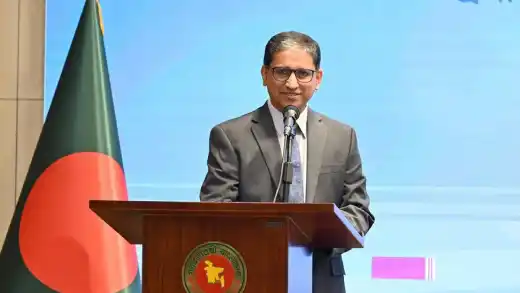“Bangladesh Sends High Commissioner to Delhi Days After Modi-Yunus Meeting in Bangkok”

Bangladesh Sends High Commissioner to Delhi Days After Modi-Yunus Meeting in Bangkok
Just days after Indian Prime Minister Narendra Modi met Nobel Laureate Dr. Muhammad Yunus in Bangkok, Bangladesh responded by sending its new High Commissioner to India. The swift diplomatic move signals Dhaka’s interest in maintaining strong ties with New Delhi amid growing regional complexities.
Bangladesh India Diplomatic Relations in Spotlight After Yunus Meeting
Bangladesh appointed Md. Mustafizur Rahman as its new High Commissioner to India and dispatched him to New Delhi shortly after the Modi-Yunus meeting.
The timing raised interest among political observers. Many believe the Bangladeshi government took this step to reassure India and avoid any misinterpretation of recent developments.
Rahman brings decades of experience in international diplomacy. He previously served as Bangladesh’s Permanent Representative to the United Nations and held postings in Geneva and Brussels.
Yunus Meeting Signals Fresh Diplomatic Momentum
During the BIMSTEC Summit 2025 in Bangkok, Prime Minister Modi held a brief but significant meeting with Dr. Muhammad Yunus.
The meeting drew international attention. Dr. Yunus, who won the Nobel Peace Prize for founding Grameen Bank and pioneering microfinance, currently faces several legal battles in Bangladesh. Authorities accuse him of violating labor laws and mismanaging funds.
Many international organizations, however, have called these charges politically motivated. Critics believe the Bangladeshi government wants to suppress independent voices. Modi’s meeting with Yunus seemed to signal India’s support for freedom of speech and democratic norms.
To understand Dr. Yunus’s legal case better, you can read this New York Times article.
Bangladesh Moves to Restore Diplomatic Balance
By promptly sending Md. Mustafizur Rahman to India, Bangladesh aimed to manage the narrative. It showed India that Dhaka values open communication and peaceful diplomacy.
The High Commissioner’s position had remained vacant for several months, which some saw as a sign of cooling relations. This quick appointment changed that perception.
Rahman’s arrival in New Delhi sends a strong message. It shows Bangladesh’s willingness to work closely with India, especially after the sensitive Yunus-Modi meeting.
The Complex India-Bangladesh Relationship
India and Bangladesh share deep-rooted connections. Their history, culture, and geography bind them together.
India supported Bangladesh during its liberation war in 1971 and continues to be a major strategic and economic partner. Both countries benefit from cross-border trade, energy cooperation, and security partnerships.
However, their relationship faces periodic tension. Issues such as river water-sharing, illegal migration, and border incidents often create friction. India also watches Bangladesh’s growing closeness to China with caution.
Despite these challenges, both sides understand the value of staying connected through diplomacy and mutual respect.
Diplomatic Timing and Strategy
The sequence of events seems carefully planned. Modi met Dr. Yunus in Bangkok, creating headlines across the region. Within days, Bangladesh appointed and sent a senior diplomat to New Delhi.
This isn’t a coincidence. It appears to be a direct attempt to counter any negative assumptions. Rather than making public statements, Bangladesh used action to show where it stands.
Analysts describe this as smart diplomacy. Instead of reacting emotionally, Dhaka responded with professionalism and strategy.
India Welcomes the Move
Indian officials quietly welcomed Rahman’s appointment. While the government hasn’t issued a formal statement about the Yunus meeting, sources inside the Ministry of External Affairs confirmed that they see the move as positive.
India considers Bangladesh an important neighbor under its “Neighbourhood First” and “Act East” policies. Maintaining influence in the Bay of Bengal and countering China’s regional reach remain top priorities for New Delhi.
One senior official said, “We are glad to see a seasoned diplomat posted in Delhi. It shows Bangladesh wants to continue forward-looking talks.”
What Lies Ahead?
Now that Bangladesh has filled the diplomatic post in Delhi, attention shifts to what comes next.
Officials expect fresh talks on border security, trade agreements, and river-sharing projects. India might also send a top-level delegation to Dhaka in the coming months to reaffirm ties.
There’s growing speculation that both countries want to reset their diplomatic tone before upcoming elections. The next few months could bring renewed partnerships, deals, and maybe even some surprise visits.
The Yunus Issue: A Diplomatic Flashpoint
Although the Bangladeshi government insists the legal cases against Yunus follow the law, international opinion says otherwise. Groups like Amnesty International and the International Labour Organization have raised concerns.
Modi’s meeting with Yunus didn’t include public comments, but the gesture itself spoke volumes. Observers believe India wanted to remind Bangladesh of its international image and the importance of civil liberties.
While India usually avoids commenting on internal matters of neighboring countries, this symbolic act shows that it pays close attention to regional developments.
Renewed Hopes for Regional Cooperation
The latest events offer a chance to rebuild trust. With Rahman in New Delhi and the Yunus conversation fresh in memory, both sides have reasons to talk, resolve disputes, and create new plans.
Experts believe informal talks—often held behind closed doors—will increase. These discussions help reduce tension and open space for bigger deals.
Bangladesh and India must work together if they want peace and prosperity in the Bay of Bengal region. Strong diplomacy can help them overcome past mistakes and future uncertainties.
Conclusion
Bangladesh’s quick appointment of a new High Commissioner after Modi’s meeting with Dr. Yunus wasn’t random. It was a thoughtful move meant to reinforce trust and maintain a healthy relationship with India.
As geopolitics grow more complex in South Asia, timely diplomatic gestures like this one show the importance of clear, calm, and coordinated action. Both countries now have an opportunity to move forward with renewed energy and mutual respect.
Whether this marks a new chapter or a temporary pause in tensions depends on what they do next. But for now, the signs of cooperation are stronger than the signals of conflict.






